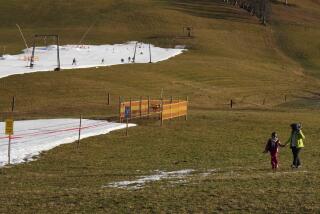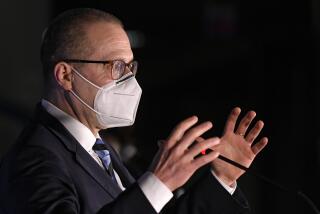European Nations Issue New Fallout Warnings
- Share via
BONN — Governments in Western Europe issued new public warnings Sunday about radioactive fallout from the Soviet nuclear disaster, and some of Moscow’s own allies also ordered precautions.
But Swedish government experts said the worst effects of the Soviet disaster have passed and criticized some of the safety measures adopted in Western Europe as overreaction.
Gunnar Bengtsson, the head of Sweden’s Radiological Protection Board told a news conference: “The emergency is over. Now we can start drawing lessons for the future.”
Swedish experts said some safety measures, including bans on consumption of vegetables and restrictions on food from Scandinavia, were “panic-stricken attempts to make up for a late start.”
“We think other countries were a bit slow at the start. When they finally did do something about it, they imposed strong, extremely strong, safety measures as a kind of reaction,” Bengtsson said.
Sweden’s Advice
Sweden has so far only advised against drinking rainwater and eating wild vegetables. It is also submitting all shipments of food from Eastern Europe to radiation tests.
The Polish government released the first concrete data on radioactive contamination since an increase was detected a week ago.
The report followed an admission on state television Saturday night that a partial news blackout had been imposed to avoid public hysteria.
Between April 28 and May 2, milk contamination exceeded admissible levels for children by 72%, but the highest atmospheric contamination recorded was 20% of the emergency level established by the International Atomic Energy Agency, the Polish news agency PAP said.
Members of a government commission, set up to monitor the aftermath of the April 26 disaster, told viewers that information had been suppressed in the public interest.
Britain extended checks on milk supplies throughout the country after detecting radiation from the Soviet accident. It said the amounts were within safety limits.
In West Germany, radioactivity levels of the air fell but soil radioactivity rose slightly in some areas after rainfall, an Interior Ministry official said. He said the levels posed no danger.
In the Netherlands, the Dutch Agriculture Ministry said that while radiation in the air has fallen to near normal levels, it issued a ban forbidding farmers to allow cows to graze in pastures for at least a week.
Dutch authorities reported an increase in radioactivity in the Rhine and Meusse rivers and in Lake Ijsselmeer but said the levels did not endanger drinking water or swimmers.
In Romania, the official news agency Agerpres said radiation levels were declining but were still above normal.
Four of Austria’s nine provinces forbade farmers to feed their cows on pastures. People were told to drink only processed milk and refrain from buying milk from farmers.
In Bulgaria, the official news agency BTA said radiation levels showed no danger for the population or environment, but Turkey said that radiation near the Bulgarian border was increasing and warned Turks not to touch rainwater.
More to Read
Sign up for Essential California
The most important California stories and recommendations in your inbox every morning.
You may occasionally receive promotional content from the Los Angeles Times.













